(November 1953 – January 1954: Young Romance #63 – #65, Young Love #51 – #53, Young Brides #9 – #11)
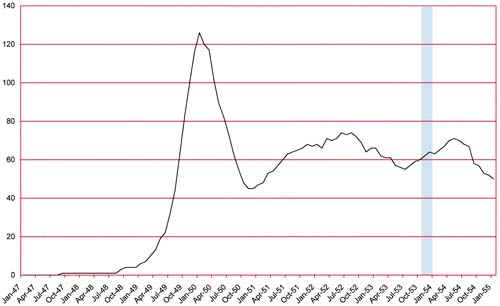
Number of Romance Titles 1947 – 1954 (the period covered in this chapter is shaded in blue)
There have been no significant changes in the romance comics from that reported in the previous two chapters. One variation, or rather the lack thereof, is that almost all the stories are exactly 6 pages long. The only exceptions are some two or single page features, two stories by Jack Kirby (7 and 8 pages long) and one by Al Eadeh (4 pages). Previously the title Young Brides had become a monthly publication and so this chapter covers 9 comics. The line up of contributing artists is Jack Kirby (63 pages), Bill Draut (36 pages), John Prentice (36 pages, Mort Meskin (18 pages), Bob McCarty and an unidentified artist (13 pages each), Mort Laurence and Bill Benulis (12 pages each), Al Eadeh (10 pages), a single story by another unidentified artist (6 pages) and 6 single page features but a probably studio assistant. As can be seen in the list there are some new names among the studio artists.
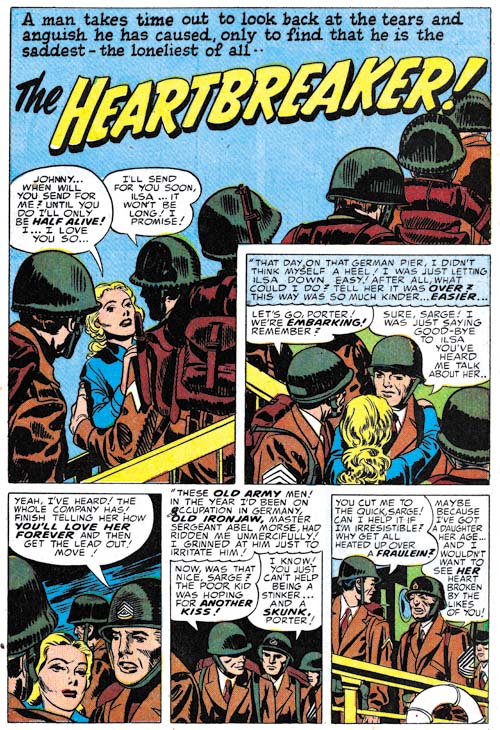
Young Romance #64 (December 1953) “The Heartbreaker”, art by Jack Kirby
There were no full page splashes but Jack Kirby’s art is still first rate, even compared to his work from other periods. With the reduced size splashes Kirby favored an angular format. Such a panel shape would have been a challenged for most artist but Jack makes good use of it. Observe how the main action of the splash for “The Heartbreaker” occurs in the lower corner making it visually fit in with the second panel. Kirby then uses the helmets of the soldiers ascending a boarding ramp to provide a diagonal from the lower left to the upper right. The second panel hardly seems to intrude at all.
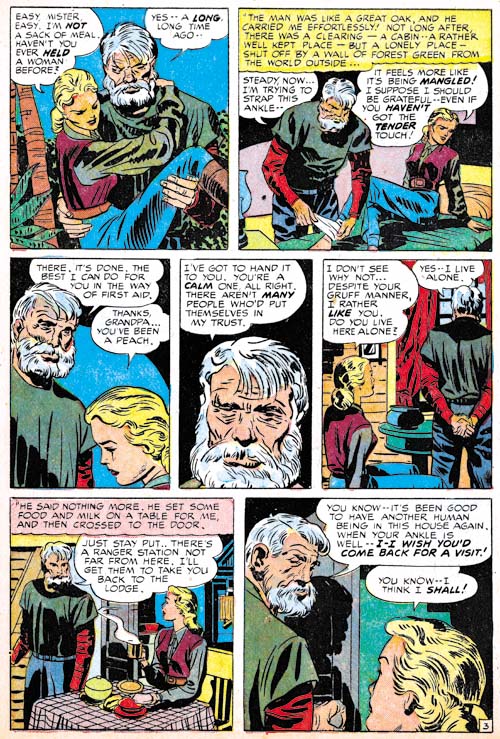
Young Romance #63 (November 1953) “A Matter of Pride” page 3, art by Jack Kirby
While I usually provide examples of the splash pages, it is important to remember that Kirby was primarily a story teller. Once again during this period Jack’s graphical story-telling is first rate. I particularly like the way Kirby drew older men. The craggy face of white haired man in this story perfectly matches his rustic life.
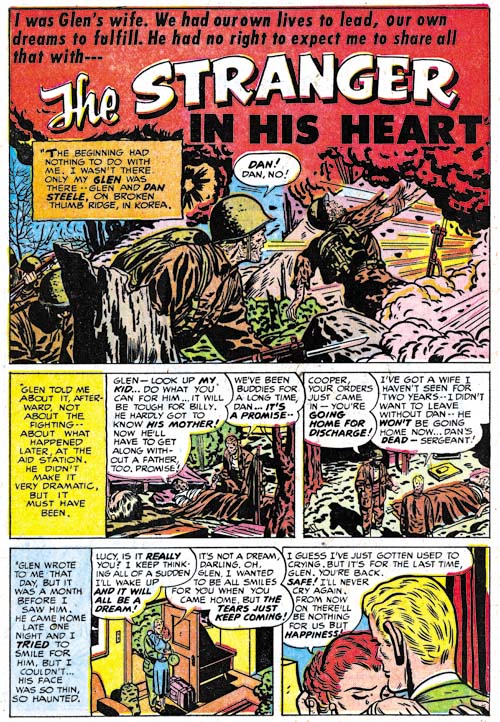
Young Brides #10 (November 1953) “The Stranger in His Heart”, art by Bill Draut
Most romance stories are about, not surprisingly, young love. However stories with other themes would occasionally appear in Simon and Kirby romance titles. “The Stranger in His Heart” is about the entry of the orphaned son of a combat buddy into the life of his young wife. It is the sort of story that Bill Draut is particularly good out, being second only to Jack Kirby among the studio artists.
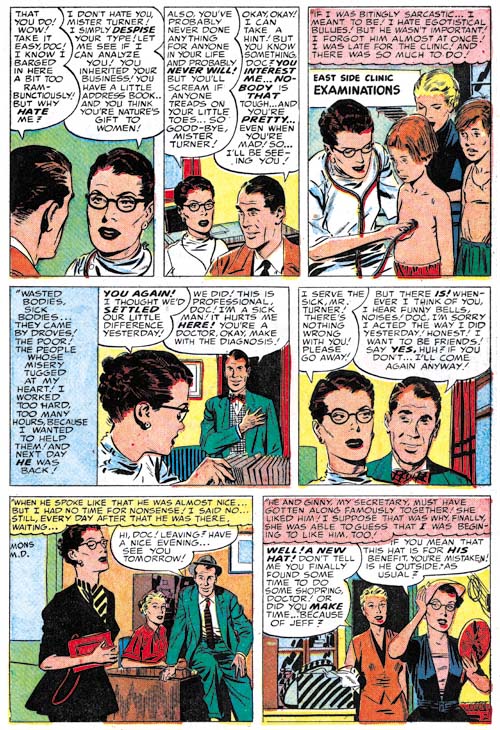
Young Romance #64 (December 1953) “The Doctor is in Love” page 2, art by John Prentice
One of the formats that John Prentice would use during the period involved the use of tall narrow panels. This type of panel layout had previously been used by artists like Leonard Starr, Mort Meskin and Ross Andru; however at this time Prentice seemed to be the only studio artist that would sometimes use such narrow panels.
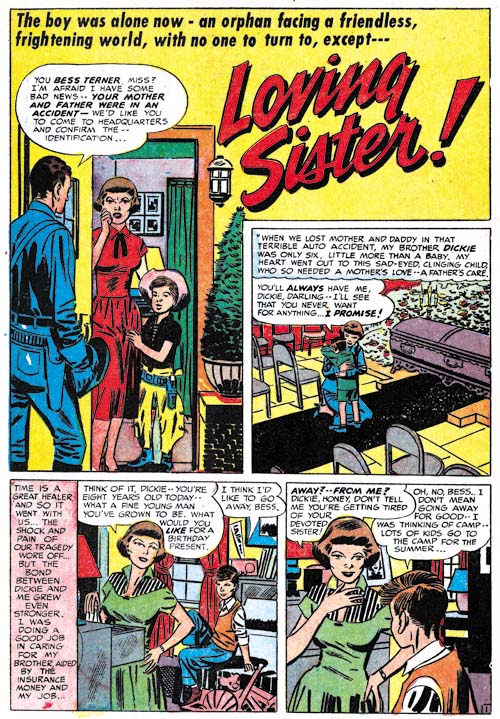
Young Love #52 (December 1953) “Loving Sister”, art by Mort Meskin
As I have remarked in the previous couple of chapters, Mort Meskin contributed much less than what would be expected towards Simon and Kirby productions. For a few years Mort had been working almost exclusively for Joe and Jack. However in recent months his work had been appearing in other publishers’ comic books. But it would appear that Meskin’s combined output was much lower then previously. Whatever the reason behind this change, it must have been financially tough times for Meskin.
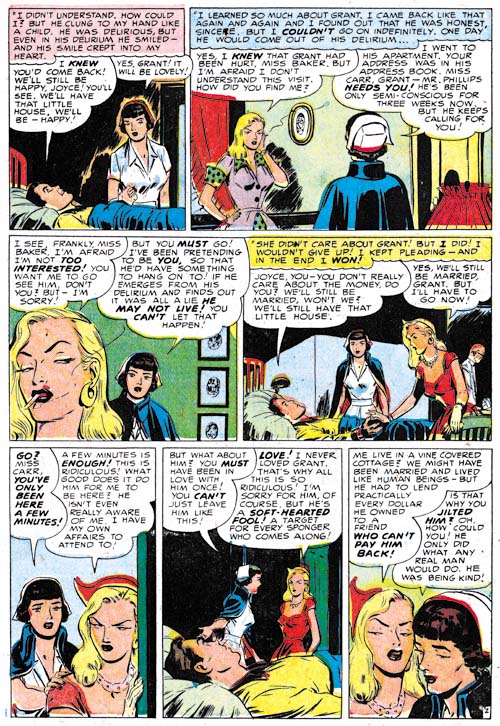
Young Love #51 (November 1953) “The Will to Love” page 2, art by Al Eadeh
Al Eadeh had not been a major contributor to S&K productions but he had been a regular one for some about a year and a half. Eadeh was not the greatest of the studio artist but he showed some improvements over time. His earlier work for Joe and Jack were rather stiff but in his more recent work he does quite well in graphically telling a story. I love this page of the interaction of the good hearted nurse and a gold-digger. Sure it is a little over the top, but that is what comics are for!
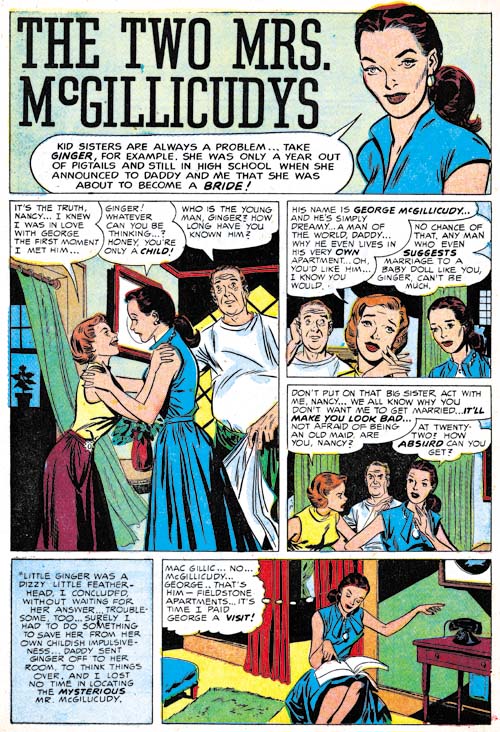
Young Romance #63 (November 1953) “The Two Mrs. McGillicudys”, art by unidentified artist
“The Two Mrs. McGillicudys” and “Summer Replacement” are two stories by the same unidentified artist I mentioned in the last chapter. I am quite fond of this mystery artist and I am sure he must have been doing romance art for some other publisher prior to doing this work. In some ways the above page is a good example of the format he liked to start his stories with. The first story panel covers an area a little more then two regular story panels. This makes it not much of a splash although more of one then some other studio artists, such as John Prentice, used. The artist also includes a head in the title box. Only one other artist, Jack Kirby, would include such head shots in the title caption. But in this case the artist increased the size of the head and provided speech balloon. Thus he as effectively turned the title into a second splash. It is almost a confessional splash since the woman is introducing the story, but it differs from the classic S&K confessional splash in that the title is not part of the speech balloon. True Confessional splashes no longer appeared in Simon and Kirby romances and nobody else did anything like this.
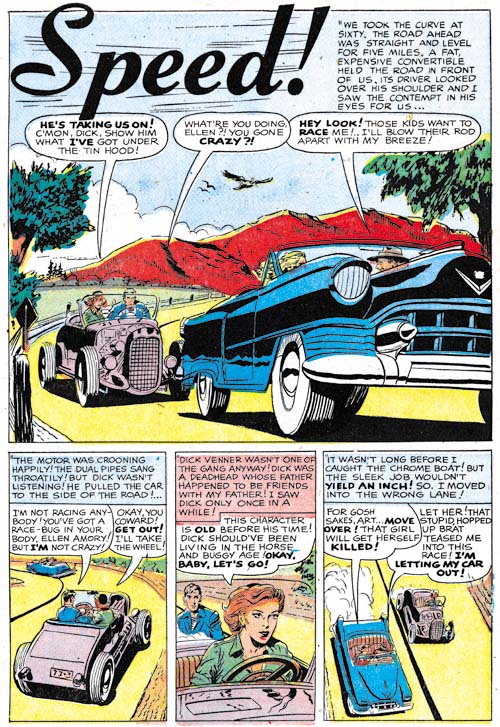
Young Love #51 (November 1953) “Speed”, art by Bob McCarty
During the review I conducted in preparation for this chapter I found two stories by Bob McCarty that in my database I had previously to another artist. I will discuss this more below. The splash for “Speed” is probably the most typical splash in all the issues covered in this post. The title is not separated into its own box, the splash takes up the full width of the page and vertically it is much greater then the row of story panels. It splash art still adheres to the latest formula of actually being part of the story but otherwise it is a perfectly typical splash.
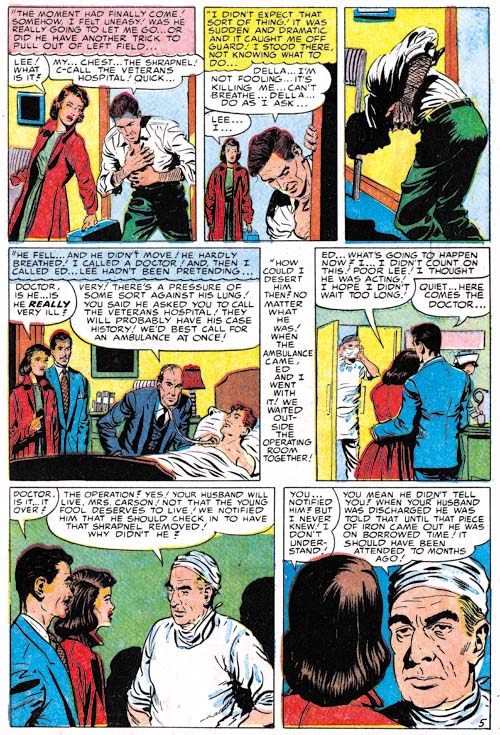
Young Love #53 (January 1954) “Sweet Talking Man” page 5, art by Bob McCarty
Both of the stories that I am now attributing to McCarty I had previously entered into my database as by John Prentice. My original entries into my database were made as I obtained the comics and depending on when that was would dictate how accurate I was likely to be. That is one of the reasons that I find the reviews that I am now conducting so useful. I find it interesting that the work Bob McCarty resembles the art of John Prentice more now then he did previously or would later. This might be due to influence; not so much Prentice influencing McCarty’s art as much as both of them being influenced by the great syndicate artist Alex Raymond as particularly seen in his Rip Kirby strip. Another possibility is that McCarty and Prentice knew one another and that Prentice may have helped in some on these particular stories.
I purposely choose page 5 from “Sweet Talking Man” because it most clearly shows McCarty’s hand. The doctor in the final panel as eyes that art larger then Prentice would use but typical for McCarty. The woman also lacks Prentice’s more sophisticated beauty. The fact that I have now found three stories by McCarty that I have previously missed makes me suspect that perhaps more will be uncovered as I continue my reviews.
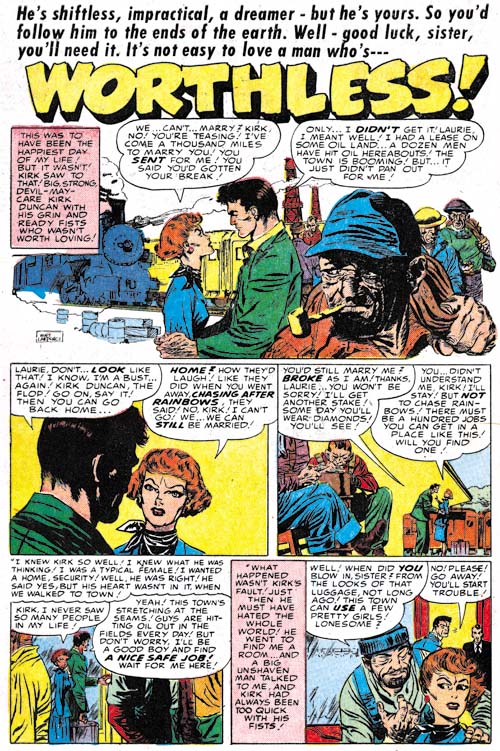
Young Love #52 (December 1953) “Worthless”, art by Mort Lawrence
New to the Simon and Kirby productions, but certainly not new to the comic industry, is Mort Lawrence. The GCD� only lists a single romance work by Lawrence (Love Diary #2, October 1949). I suspect that is just due to the general bias against love comics by most comic book collectors. That said, judging by the work he did for S&K Lawrence really was not that great at the romance genre. But check out the older man in the splash. A similarly downtrodden gentleman appears in the splash of Lawrence’s “Love Me, or Else” (YR #65, January 1953) as well.
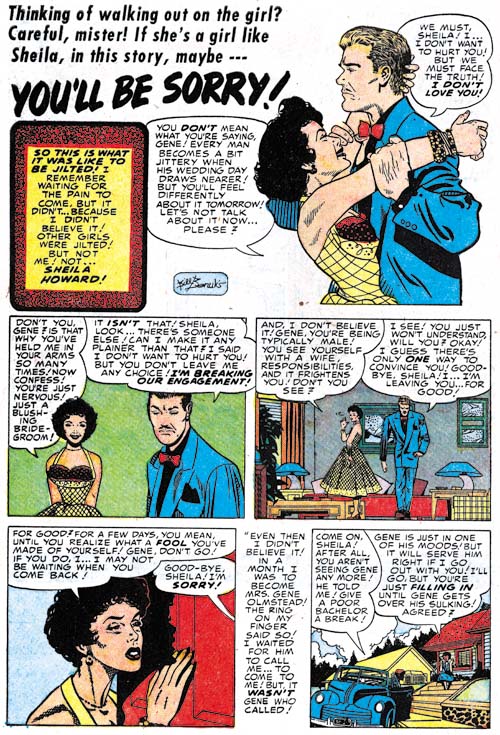
Young Love #53 (January 1954) “You’ll Be Sorry”, art by Bill Benulis
Another new artist to start working for Simon and Kirby was Bill Benulis. Benulis was new to comics and his art has a more modern approach. I like some of his techniques but he gives his woman a scratchy look which is very unfortunate thing to do in romance comics. Benulis entry into comics was ill timed and he seems to have been a victim of the crash that would affect the comic industry in a few years.
Chapter 1, A New Genre (YR #1 – #4)
Chapter 2, Early Artists (YR #1 – #4)
Chapter 3, The Field No Longer Their’s Alone (YR #5 – #8)
Chapter 4, An Explosion of Romance (YR #9 – #12, YL #1 – #4)
Chapter 5, New Talent (YR #9 – 12, YL #1 – #4)
Chapter 6, Love on the Range (RWR #1 – #7, WL #1 – #6)
Chapter 7, More Love on the Range (RWR #1 – #7, WL #1 – #6)
Chapter 8, Kirby on the Range? (RWR #1 – #7, WL #1 – #6)
Chapter 9, More Romance (YR #13 – #16, YL #5 – #6)
Chapter 10, The Peak of the Love Glut (YR #17 – #20, YL #7 – #8)
Chapter 11, After the Glut (YR #21 – #23, YL #9 – #10)
Chapter 12, A Smaller Studio (YR #24 – #26, YL #12 – #14)
Chapter 13, Romance Bottoms Out (YR #27 – #29, YL #15 – #17)
Chapter 14, The Third Suspect (YR #30 – #32, YL #18 – #20)
Chapter 15, The Action of Romance (YR #33 – #35, YL #21 – #23)
Chapter 16, Someone Old and Someone New (YR #36 – #38, YL #24 – #26)
Chapter 17, The Assistant (YR #39 – #41, YL #27 – #29)
Chapter 18, Meskin Takes Over (YR #42 – #44, YL #30 – #32)
Chapter 19, More Artists (YR #45 – #47, YL #33 – #35)
Chapter 20, Romance Still Matters (YR #48 – #50, YL #36 – #38, YB #1)
Chapter 21, Roussos Messes Up (YR #51 – #53, YL #39 – #41, YB #2 – 3)
Chapter 22, He’s the Man (YR #54 – #56, YL #42 – #44, YB #4)
Chapter 23, New Ways of Doing Things (YR #57 – #59, YL #45 – #47, YB #5 – #6)
Chapter 24, A New Artist (YR #60 – #62, YL #48 – #50, YB #7 – #8)
Chapter 25, More New Faces (YR #63 – #65, YLe #51 – #53, YB #9 – #11)
Chapter 26, Goodbye Jack (YR #66 – #68, YL #54 – #56, YB #12 – #14)
Chapter 27, The Return of Mort (YR #69 – #71, YL #57 – #59, YB #15 – #17)
Chapter 28, A Glut of Artists (YR #72 – #74, YL #60 – #62, YB #18 & #19, IL #1 & #2)
Chapter 29, Trouble Begins (YR #75 – #77, YL #63 – #65, YB #20 – #22, IL #3 – #5)
Chapter 30, Transition (YR #78 – #80, YL #66 – #68, YBs #23 – #25, IL #6, ILY #7)
Chapter 30, Appendix (YB #23)
Chapter 31, Kirby, Kirby and More Kirby (YR #81 – #82, YL #69 – #70, YB #26 – #27)
Chapter 32, The Kirby Beat Goes On (YR #83 – #84, YL #71 – #72, YB #28 – #29)
Chapter 33, End of an Era (YR #85 – #87, YL #73, YB #30, AFL #1)
Chapter 34, A New Prize Title (YR #88 – #91, AFL #2 – #5, PL #1 – #2)
Chapter 35, Settling In ( YR #92 – #94, AFL #6 – #8, PL #3 – #5)
Appendix, J.O. Is Joe Orlando
Chapter 36, More Kirby (YR #95 – #97, AFL #9 – #11, PL #6 – #8)
Chapter 37, Some Surprises (YR #98 – #100, AFL #12 – #14, PL #9 – #11)
Chapter 38, All Things Must End (YR #101 – #103, AFL #15 – #17, PL #12 – #14)


I too had noticed Bob McCarty’s shift towards a more sedate Raymond influenced style, but as you say his own peculiarities keep coming through. Thr nre unidentified artist is intriguing. He clearly belongs in the advertising art school and I keep thinking he reminds me of Leonard Starr. There is a later page by Starr from Boy’s Life on my blog you could look at for reference. Remember that Starr didn’t start Mary Perkins until later in the fifties, so he would be available for comic book work even if he wasn’t signing it anymore. Still, it can’t have made him the money the advertising work brought. Another similar artist from that school who wokred all over the place was Irv Novick, but I see none of his flourishes here.
Ger,
Your suggestion of Leonard Starr is a very good one. Some of the women seem to have that elfish look to them that Leonard favored. However some stories by Starr show up in a few months and in those his style has not changed much at all from the last time he worked for Simon and Kirby (early 1951). So in the end I doubt if the mystery artist is Leonard Starr.
I’m catching up with posts I’ve missed, working backwards, but the “mystery artist” here again reminds me a bit of Jim Mooney, although less so than the other story. If it is his work, it is heavily inked by someone else in this story.
Nick C.